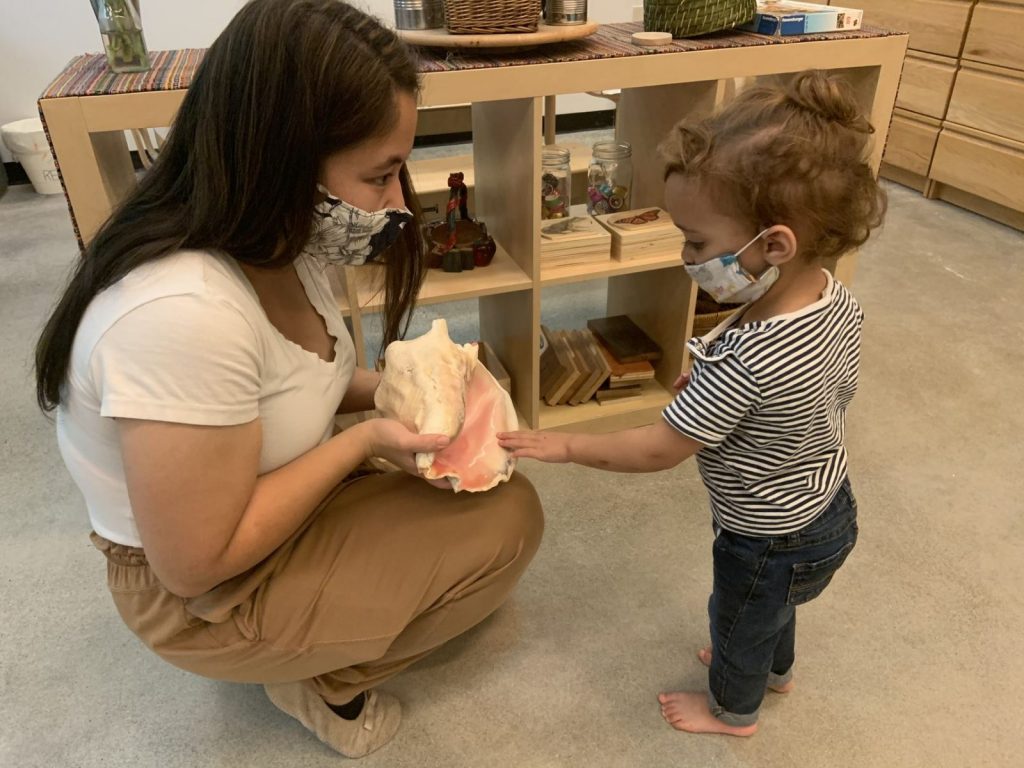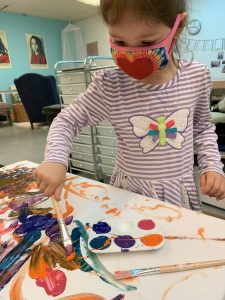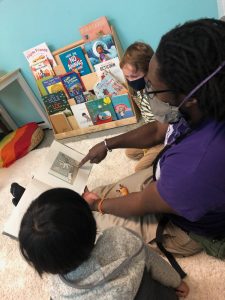
A Filipinx Lens on ECE
“Being vulnerable and sharing a piece of yourself might be the hardest thing we do as humans. What if we are rejected? What if we aren’t liked? What if we are othered? Being part of a group that is often lumped in with others, the world often forgets just how brilliant and beautiful our people are. In this interview, Mike (he/him), chats with a couple of Hilltop’s Filipina educators of color on various topics including Filipina/x American Heritage Month (FAHM), vulnerability, broadening children’s perspective, and more.
Mike: Hi Jireh and Reiane. Happy FAHM and thanks for having this chat with me. In preparation, I thought a lot about being a male, being Afro-Caribbean, and the pressure to achieve this narrowly defined definition “success” as well as the road society says Black males should take to achieve such. And early childhood education was not one of them. Is that the same for your culture?
Jireh: Absolutely. In my Filipino heritage, when you go to college you had 3 choices: medicine, law, or business. So, it’s safe to say that my journey to becoming an educator was not the easiest. I had to fight against the expectations my family and my relatives had on me.
Mike: If I had a nickel for every expectation that I didn’t live up to, I might actually be retired and in the Philippines right now. But I say that because I think most people look at the locs in my head, my bigger built, and know I used to play collegiate football and expect me to follow Tough Guy Syndrome. Not just in the physical sense, but also in the sense that I wouldn’t want to talk about my feelings, or the sources of my insecurities, or my mental health. And that wasn’t always a thing, but luckily I have some strong Black brothas in my community who have normalized that for me. It goes to show just how important representation is and how much that matters.
Jireh: It really does. I know that’s a line many people throw out but look how it has helped you and me. Most of my family members and relatives were doctors. We’re in fields that Filipinos are stereotyped into. But I had someone in my family who helped me break free of that pattern and paved a way for me to get to where I am now. And that’s my momma! She was an elementary school teacher back in the Philippines. Seeing that as an option for her. Seeing that as an option that could be pursued. Representation sometimes is talked about in abstract ways but here it is. Living proof that representation can and does matters in real and practical ways.
Mike: And that language is something we can all agree on. Representation matters. Language matters.

Reiane: Food matters!
Mike: Ha! It does. Food is a language.
Reiane: It’s a universal language.
Mike: Tell me more.
Reiane: Food is a universal language. Everyone needs to eat and nourish their bodies in order to keep going with the day. Food is also an important part of almost every culture, including mine. That opportunity for connection over a satisfying and yummy meal is also a huge learning opportunity in the classroom, and it provides a lot of insight into the lives we all live outside of school.
Mike: How do you use food as provocation in the learning environment?
Reiane: As a Filipina-American identifying educator, food is a favorite subject of mine to discuss with my kiddos. I can focus on culture, self-care, language, math, science, social skills, and so much more. But at the root of it, food is an opportunity to help my preschool friends to discover new perspectives in life.
Mike: How so?
Reiane: When we sit down for lunch, it’s natural to want to share what they are eating. And at times, when they see all the different types of foods that they might not notice, they might call it “yucky” or say “I’m allergic to different flavors Ms. Reiane” which sometimes they are but a lot of times they are not. And that’s a perfect time to not, shame them for saying that, but to help them realize the impact of their words. As a person of color growing up, I was shamed or made of fun for the Filipino food I’d bring for lunch. For a 3 year old who might not have a say and are just bringing in the food their caregivers have prepared them. For the toddler who is bringing in the food which is comforting and familiar to them, that can be such a disheartening and awful moment, every single time. The weird looks I received, the frowning mouths, the people sticking their tongues out, and the teachers who allowed it to happen without a conversation about how that might make other people feel, made me extremely ashamed of who I was, where I came from, and my family’s food. For a while, I had a hard time wanting to share parts of me and the amazing food I loved to eat, despite adobo or arrozo caldo, being one of my favorite things ever!
Mike: Even though I lived in a city, I grew up in a food desert area. In other words, areas where healthy foods are hard to find (for a variety of reasons). And that’s a form of trauma that doesn’t really come to people’s mind – Food trauma. With food trauma, many people only eat foods that are familiar with them or are considered “safe” food. With those with high ACEs, food trauma might show up or may have been caused through anxiety, the banning of food, the rejection of food, family style eating (family style eating is a very reggio however, sharing bowls or plates when resources are limited can be triggering from some) and more. So this is all to say that food is personal. How were you able to overcome this own personal shame you might as felt and what message would you tell others who might be hesitant in being vulnerable in this aspect of their work.

Reiane: As a teacher, I want to do everything in my power to prevent any of my own students of color to experience that, or for any of my students to do that to anyone else. As universal as food can be, food is also incredibly personal. There are varying degrees of vulnerability that each educator can comfortably include in their work, and personal things like food does take some internal reflection before being able to open ourselves up to share it with others. Sharing my culture leaves me vulnerable in lots of layered ways, but I’ve found the gains to be more than worth it.
Mike: Our colleague, Paty (she/her), recently put out a blog asking “What does community mean to you? ” So, I want to ask you Jireh, the same thing.
Jireh: It’s hard to really boil it down to one thing. Sure, when I first came to this organization, and got to know people, I noticed the different backgrounds that educators were coming to us with. From art degrees, to Montessori experience, school districts, afterschool programs, and more. I noticed some had similar skin tones as mine. But when I think about community, what that means, and what a sense of belonging feels like, it comes down to me being able to bring forth my authentic self as an educator. Why? How? Because I am surrounded by a community of educators who welcome people of different cultures and backgrounds. And not in the superficial sense. But they are actively seeking those people, they are actively changing their culture, policies, and procedures to allow for diverse perspective, and they are actively working in all areas of their practice to dismantle oppressive practices. Coming into a community and being able to share a part of myself with others as well as the children that I serve whether that is through bringing traditional Filipino food like lumpia for the educators, jamming on the ukulele during circle time, or sharing stories of my upbringing, is truly special.
Reiane (she/her/siya), is an educator working with 3-5 year olds at Seattle Institute for Early Childhood Development dba Hilltop Children’s Center and Educator Institute since 2020.
Jireh (she/her/siya), is an educator working with 3-5 year olds at Seattle Institute for Early Childhood Development dba Hilltop Children’s Center and Educator Institute since 2017.